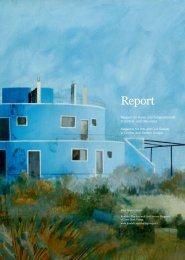Report_Issue 1/2009 - Jubiläum/ 20 Jahre Mauerfall
Report_Issue 1/2009 - Jubiläum/ 20 Jahre Mauerfall
Report_Issue 1/2009 - Jubiläum/ 20 Jahre Mauerfall
Sie wollen auch ein ePaper? Erhöhen Sie die Reichweite Ihrer Titel.
YUMPU macht aus Druck-PDFs automatisch weboptimierte ePaper, die Google liebt.
„ Wir Übersetzer werden nicht aufgeben<br />
und weiterhin übersetzen“<br />
Urška P. Černe „Wir ideologisch unterschiedlich gebauten und schließlich doch gleichgeschalteten<br />
Völker im Osten, Westen, Süden, Norden Europas erlebten eine vielleicht<br />
nicht gleiche, aber doch ähnliche weltanschauliche Sozialisation – letztendlich mithilfe<br />
von Übersetzungen. Ich war 26 <strong>Jahre</strong> alt, als ich Hofmannsthals ,Brief des Lord Chandos‘<br />
ins Slowenische übersetzte. Diese Literatur hat meine Gefühlswelt bestimmt und mir vor<br />
allem zu einer Einsicht verholfen: Sprache ist nicht unbedingt ein Transportmittel der<br />
Wahrheit. Sofern die ,Wahrheit‘ unserer Spezies überhaupt zumutbar wäre.<br />
Aber wie neugierig, zuvorkommend und aufgeschlossen müssen wir Europäer letztendlich<br />
doch sein, dass wir die eine ,Wahrheit‘ in der Sprache immer wieder aufspüren wollen,<br />
dass wir trotz allem vorbestimmten Scheitern immer wieder so viel übersetzen. Wir müssen<br />
geradezu von einem Glauben getrieben sein, der uns das Chaotische der Sprache,<br />
das Nicht-Seiende der Wahrheit vergessen lässt.“<br />
Ein Kommentar von Urška P. Černe, slowenische Übersetzerin<br />
von Texten von Günter Grass, H. C. Artmann,<br />
Elfriede Jelinek, Robert Schindel u. v. a. und Literaturkritikerin.<br />
Sie lebt und arbeitet in Ljubljana. Den Text hat<br />
sie auf Deutsch für den „<strong>Report</strong>“ 1/<strong>20</strong>05 verfasst.<br />
“ We translators will not give up but will<br />
continue to translate”<br />
Urška P. Černe “We, the people of Eastern, Western, Southern or Northern Europe, although<br />
we may be differently ideologically oriented, ultimately all conform to a recognised<br />
type, and all of us have experienced (in the final analysis with the help of translations)<br />
a socialisation of our world-view that, while it may not be identical, is certainly<br />
similar. I was 26 years old when I translated Hoffmansthal’s Lord Chandos letter into<br />
Slovene. This literature shaped my emotional world and above all helped me arrive at an<br />
understanding that language is not necessarily a means of transporting the truth. In as<br />
far as the ‘truth’ can be reasonably expected of our species in the first case.<br />
But how inquisitive, obliging and open-minded we Europeans must ultimately be, as we<br />
repeatedly want to discover ‘truth’ in language, and as, despite the inevitability of failure,<br />
we still continue to translate so much. We must indeed be driven by a belief that<br />
makes us forget the chaos of language and the non-existence of truth.”<br />
A commentary by Urška P. Černe, Slovene translator of<br />
works by Günter Grass, H. C. Artmann, Elfriede Jelinek,<br />
Robert Schindel (…) and literature critic. She lives and<br />
works in Ljubljana. The original text was written in<br />
German for “<strong>Report</strong>” 1/<strong>20</strong>05.<br />
66




